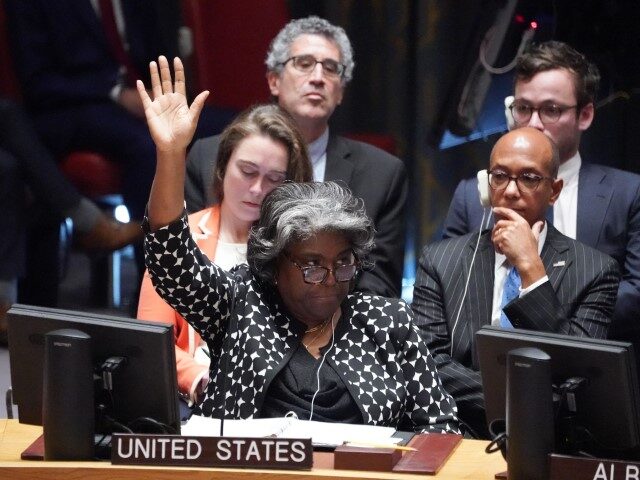The United Nations Security Council – whose self-proclaimed purpose is the “maintenance of international peace and security” – once again failed to address the October 7 mass murder of civilians by the terrorist organization Hamas in a meeting Wednesday in which America vetoed a resolution calling for Israel not to act in the face of the ongoing threat of another attack.
The resolution, penned by Security Council president state Brazil, condemned Hamas for killing 1,200 people in door-to-door slaughters in residential communities and attacks on other civilian targets, such as a music festival. It did not, however, support Israel’s right to self-defense and called for “humanitarian pauses” in the fight against Hamas, a Sunni jihadist terror group.
The Brazilian resolution is the second to fail after another draft resolution by Russia, a high-profile ally of Hamas patron state Iran, failed to receive sufficient votes for approval on Monday. The Russian resolution demanded Israel not conduct operations to protect its citizens from Hamas and failed to condemn the terrorist organization’s massacre.
The multiple resolution failures mean the Security Council has not formally addressed the Hamas attack, which the terrorist group has branded the “al-Aqsa flood,” in any way – and has not addressed the security situation in Israel and the Palestinian territories at all since 2016. The General Assembly, a larger but less powerful United Nations body, regularly condemns Israel’s existence and upholds Hamas talking points through resolutions. In December, the General Assembly passed a resolution calling the founding of Israel a “catastrophe.”
At the meeting on Wednesday, 12 of the 15 Security Council members voted to adopt the Brazilian draft resolution, which, unlike the Russian draft, would have “unequivocally rejected and condemned the terrorist attacks by Hamas that took place in Israel starting on 7 October,” according to a U.N. summary of the meeting. The resolution also demanded an end to Israel’s calls to evacuate Hamas strongholds in Gaza to avoid striking civilians. Both the United States and Russia objected to parts of the draft, but Russia abstained on the vote, whereas America voted against the draft.
America is one of five permanent members of the Security Council, alongside Russia, China, France, and Britain. A “no” vote from a permanent member counts as a veto and stops the draft in question.
“This resolution did not mention Israel’s right of self-defense,” U.S. Ambassador Linda Thomas-Greenfield said in her explanation of the veto. “Israel has the inherent right of self-defence as reflected in Article 51 of the UN Charter.”
WATCH — ISRAEL FIGHTS TERROR: Is Israel’s Response to Hamas Legal and Justified?
Joel PollakThe Brazilian government lamented the defeat of the draft resolution, asserting that Brasilia had “heeded the call [to address the Hamas attack] with a sense of urgency and responsibility,” but its hands were tied in getting the Council to act.
“Thus, faced with heinous terrorist acts against Israeli civilians, with the forceful reaction to such acts and an ever growing humanitarian disaster imposed on Gaza, the Council response we proposed was robust and balanced,” the government concluded. “Sadly, very sadly, the Council was yet again unable to adopt a resolution on the Israeli-Palestinian conflict. Again, silence and inaction prevailed. To no one’s true, long-term interest.”
“Council paralysis in the face of a humanitarian catastrophe is not in the interest of the international community,” Brazil asserted.
Russian Ambassador to the Security Council Vassily Nebenzia condemned the Brazilian draft for failing to call for a “ceasefire” – a term that would only mean Israel could not respond to Hamas’s mass killing, but would have no impact on the terrorist group’s ongoing attempts to kill Israelis – and placed the blame for the Security Council remaining silent squarely on all who did not support his draft resolution: “Anyone who did not support Russia’s draft resolution on this issue bears responsibility for what happens.”
The Russian resolution was deeply unpopular with the Council, receiving only five votes of support. Four countries – France, Japan, Britain, and America – voted against it, and six abstained, including Brazil.
“Members were divided over the lack of specific condemnation of extremist group Hamas,” the U.N. summary of Monday’s meeting, which rejected the Russian draft, explained.
Ambassador Linda Thomas-Greenfield noted that Russia was attempting to address “the worst massacre of Jewish people since the Holocaust” and had failed to responsibly do so.
“Russia’s resolution, put forward without any consultations, makes no mention of Hamas – none,” she continued. “By failing to condemn Hamas, Russia is giving cover to a terrorist group that brutalizes innocent civilians. It is outrageous, it is hypocritical, and it is indefensible.”
Nebenzia later attempted to distort the Brazilian resolution by adding amendments that would eliminate culpability for Hamas and condemn Israeli self-defense, but those resolutions failed.
WATCH — IDF: Our Statements on Hamas Beheading Babies Got More Skepticism than Hamas’ Lie Blaming Us for Hospital Blast
The Security Council has met three times since the Hamas killings, two times in an open format and once, on October 8, in a closed-door session. That session reportedly resulted in no productive measures.
“We did not discuss any joint statement, but no one proposed any text anyway,” Malta’s U.N. representative, Vanessa Frazier, said at the time.
Editor’s Note: This story was updated to reflect a revised number on the death toll from the October 7 Hamas attack in Israel. The Israeli government estimate of 1,400 was revised to around 1,200, according to Reuters.

COMMENTS
Please let us know if you're having issues with commenting.